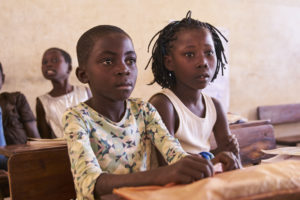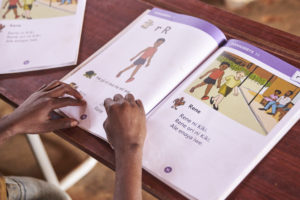In Mozambique, Vamos Ler! built foundations for success in bilingual education
By Sabra Ayres
Students in some 2,000 schools in Mozambique enrolled in a new, national bilingual-education curriculum saw substantial achievements in early grade reading and comprehension skills, thanks to the program’s emphasis on the teaching of reading skills in mother-tongue languages as the first step toward literacy.
Of the students in Grade 3 attending participating schools in two regions of the country, 43.2 percent achieved the minimum reading proficiency level after two years of instruction in 2021. Five years earlier in 2016, the Mozambique National Evaluation found that only 4.9 percent of students could reach a similar proficiency level.
The successful outcomes in reading and comprehension of early grade learners may be attributed to Vamos Ler!, a comprehensive, bilingual-education program funded by the U.S. Agency for International Development. The program, which translates as Let’s Read!, began working with the Government of Mozambique in 2017 to improve early grade literacy rates by investing in the expansion of the country’s national bilingual-education program.
Mozambique’s official language is Portuguese, but only about 50% of the east African nation’s population speaks it as their first language. Even fewer Mozambicans can read Portuguese.
The program’s core concept of bilingual education teaches early grade students the fundamentals of reading in their mother tongues in their first three years of school. In the fourth year, when students can already read in their native tongues, they are introduced to reading in Portuguese, the official state language.
“Research shows that children, who can read in their mother tongues first, transfer the skills to a second language better than forcing them to read and write in a language they don’t speak,” says Dr. Leesa Kaplan-Nunes, who served as Chief of Party for Vamos Ler!

Mozambique’s political and business spheres still revolve around the use of the Portuguese, the language still used since its independence from Portugal. Students entering grade school are instructed in Portuguese, even if they are raised speaking one of Mozambique’s more than 40 local languages.
As a result, many students drop out of school at an early age after becoming frustrated with the challenge of learning to read in an unfamiliar language. Fewer than half of Mozambican children complete primary school, and rates of teacher absenteeism are some of the highest in the world.
Mozambique’s literacy rates shrink further with each generation. The declining literacy rates are compounded by the fact that many families and communities in the past have seen little reason for sending children to school since they themselves dropped out after only a few years of instruction.
To combat the country’s illiteracy problems, Mozambique’s Ministry of Education and Human Development rolled out a national strategy for bilingual education that recognized the importance of local languages by allowing students to learn in their first language from first to third grades.
In 2016, with funding from USAID, Creative Associates International launched Vamos Ler! with the overall goal of improving reading skills of students in 21 selected districts in Nampula and Zambezia.
During the five-and-a-half-year program, Vamos Ler! trained more than 14,000 teachers and school directors, teaching and to distribute some 12 million teaching and learning materials across the two provinces, reaching nearly 2,000 schools. The program reached 700,000 students directly, with 1 million more indirect student beneficiaries.
12 million books for early grade readers
Working directly with the ministry and carefully selected language and reading experts, Creative conceptualized, developed, and printed the teaching and learning materials for grades one to four. The distribution of the materials was a massive contribution to the project’s success.
To start the process, Vamos Ler! identified three local languages– Emakhuwa, Elomwe and Echuwabo–which are spoken in targeted districts in the Nampula and Zambezia regions of the country.
Developing the materials wasn’t as simple as just translating already available textbooks from Portuguese into the local language, Kaplan said. The project consulted with local linguists and education professionals to develop standards, scope and sequence for each level, from grade one to four.
“The process was very long and intense, deciding everything from exercises for the books to the teachers’ material,” said Kaplan.

Oral Portuguese learning is included in the beginning levels of the bilingual-education curriculum but reading and writing instruction is done in mother-tongue languages in grades one to three.
There is a gradual transition into Portuguese through grade levels until year four, when the transition is made. In grade five, Portuguese becomes the language of instruction, and the mother tongue becomes a subject in school.
Altogether 500 independent titles of teaching and learning materials were developed. Each grade level included student textbooks and exercise books, as well as teacher manuals for both. There are also alphabet charts, posters to encourage reading and small-readers storybooks leveled for each grade. There are also materials for parents and communities to get involved with the student’s learning, such as large, read-aloud books for parents and community leaders to use.
With the success of the Vamos Ler! early grade reading program, Mozambique now has a proven method of developing teaching and learning materials for creating similar books and materials in Mozambique’s other local languages in the future.
Building the foundations around the books
The volume of teaching and learning materials delivered by the project is the most tangible of Vamos Ler! end-of-project achievements. But the success of the project was possible because of the project’s work to build and strengthen the foundations and systems needed to create the environment in which the books could be used, Kaplan said.
Vamos Ler! worked from the beginning of the five-year project with teachers and school directors to ensure that they had adequate support and training to make the transition from monolingual schools to bilingual schools and to successfully deliver the new curriculum to the classrooms.
Strengthening school and classroom management and instruction to leave a lasting and sustainable systemic improvement in the country’s bilingual education program were vital components of Vamos Ler!
Mozambique had seen historical trends in low school attendance stretch across generations. Vamos Ler! combined programming that promoted community engagement to build confidence in the national government’s bilingual education rollout. Part of that included engaging parents, teachers, and students together to see the benefits of the new bilingual education system to bolster support coming from the child’s home to stay in school.
In many instances, parents at first resisted the idea of bilingual education, fearing that if their child were not taught Portuguese in the beginning, they would not perform well on national tests or even succeed in finding good employment in the future. Through community engagement campaigns such as radio theater, Vamos Ler! worked to convince the parents that by starting early grade readers in their local language, they were building the foundations for the students to stay in school until graduation, Kaplan said.
Vamos Ler! managed to keep momentum, even though the interruptions caused by the COVID-19 pandemic.
For bilingual education to work in Mozambique, “the school environment needed to change, the parent and community perceptions needed to change,” Kaplan said. “There’s a lot of things surrounding the books that were needed to make it a success.”

